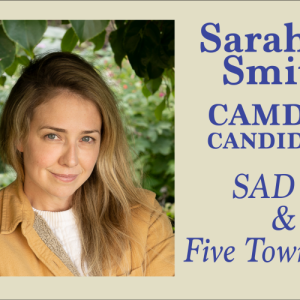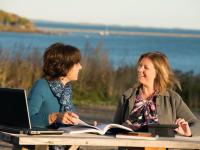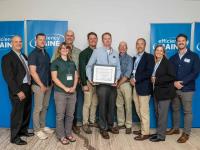SAD 28 and Five Town CSD Board Camden Candidate Sarah E. Smith
On June 10, Camden will vote for two candidates from a field of four candidates to serve on the School Administrative District 28 (Camden-Rockport K-8) and Five Town CSD (Camden Hills Regional High School) school boards.
PenBayPilot.com has circulated questions to school board candidates, who include Rafael (Rafi) Baeza, Rebecca Flanagan, A. Taylor Pohlman and Sarah E. Smith. Here, Sarah E. Smith responds.
Please present a short biography of yourself.
Hi, I’m Sarah! My husband Andrew and I moved to Camden a few years ago with our three young children: Lily (now 8), Jack (6) and Wyatt (3). The older two are current CRES students, and the youngest goes to preschool at Seaside Village, another fantastic school. The five of us—along with our two naughty rescue dogs—have been so happy living here. We have found wonderful friends, the kids are thriving, and we already feel a real connection and devotion to this community, which is why I am raising my hand to run for School Board.
I grew up in Delaware with my mom running our family business in the Port of Wilmington. I worked summers there at the company’s weigh station, weighing trucks and getting dirty. I loved that summer job, but my favorite part of every summer was when my grandmother would rent a house in Friendship for a week and bring my family along.
After high school, I got my B.A. in American Studies from Georgetown, then moved to New York City to start a career in magazine editing. After a few years, I got my MBA specializing in marketing and strategy from NYU’s Stern School of Business.
My most recent professional job was at Uber’s corporate office, where I was in charge of all marketing content and communications aimed at the Northeast U.S. market.
During the pandemic when our daycare closed, I stepped back from paid work to take care of our little kids full-time—the hardest job there is, let me tell you!
Andrew and I wanted our kids to have a childhood outside the city, and Midcoast Maine—which had a very special place in my heart and where Andrew had family roots—was the perfect spot for us. We couldn’t be happier with our decision.
I am currently on the board of the Coastal Children’s Museum in Rockland, I volunteer regularly at CRES, and I am eager to do more to help keep this community strong and vibrant.
What do you hope to accomplish as a public K-12 school board member for your town?
Truthfully, serving on the School Board or running for any elected position was not on my roadmap until the past year, when I became very involved in the push to keep the Spanish program at CRES from being cut.
Through that, I got a closer look at how the school system operates, and I feel that the School Board would benefit from having strong, capable leaders who also have a kid currently in the school system, so that as a board, they have a better understanding of how the schools function day-to-day.
I also feel that the board could work in closer partnership with both parents and teachers; they have a front-row seat to the student experience, and they have valuable insight into what the current needs are and how the school system can better serve (and welcome) a diverse group of kids and families.
Due to the relationships I am building with fellow parents and through my everyday interactions with teachers and administrators, I am in a very strong position to help close that gap.
How do you view the role of public education in the U.S., in Maine, and in Camden and Rockport?
There’s the obvious answer that schools are responsible for teaching children the basic academic skills they will need to function as adults (reading, writing, math, etc.). I believe it’s also a school’s job to expose students to an array of subjects—such as music, art, language, the sciences—beyond the “practical” ones so that kids have opportunities to discover their interests, expand their ways of thinking, and have a richer education.
Finally, I believe that public schools should be a support system for children and their families, and a safety net for the kids who do not have one at home. Things like special classroom accommodations, extra academic support, and mental health/relationship counseling should not be hard for children and families to get, yet so often it is an uphill battle, either due to deficiencies in the lengthy qualification processes or due to a lack of resources at the school.
This 360-approach to education prepares students to become functioning adults, critical thinkers and creators with a well-rounded education, and healthy members of our community.
Should pre-K programs be expanded?
Yes, but that could take various forms. I think every child should be able to attend pre-K, as many studies have shown how advantageous it is, for both the child and the caregiver that may need or want to work outside the home. We are off to a good start with CRES’s pre-K program, but the kids I worry about are the ones who aren’t selected for it (simply through bad luck in the lottery, as CRES has only been able to accommodate roughly 40-50% of the students who enter it) and whose families are not able to pay for a year of private preschool tuition.
It’s just not fair that those children would be at a disadvantage. So, I would absolutely want to work on a solution for this, whether it be expanding the pre-K program at CRES itself or partnering with private preschools in the area to help cover this need. A deeper analysis of the issue would be needed to determine next steps.
Is the free meal program worthwhile and is there enough local fresh food from area farms being integrated into the meal program?
Yes, the free meal program is very important and should absolutely continue. Food scarcity is becoming more and more common in our area, and the teachers are seeing that firsthand.
I’ve heard from CRES teachers that some children routinely come to school without the two snacks they are supposed to have in their backpack each day, so the teachers give them snacks out of their classroom supplies.
The distressing part for teachers is not that they have to do this additional task (they always go above and beyond to meet their students’ needs); it’s that by giving out free snacks to the kids who need them every day, it singles them out in front of their peers.
No kid should have to 1) go without the food they need to thrive, or 2) feel ashamed because of their family’s financial circumstances.
As for local fresh food, of course I would love to see more of it integrated into the meal program if supply and budget were to allow it, but for me, there are other things higher up on the list of priorities, such as ensuring student safety, making sure our teachers have what they need to do their best work, maintaining facilities, more mental health and guidance resources for students, and keeping the “specials” programs like music, art, and world languages in good health.
Does the curriculum adequately teach all children and teens about their role in a participatory democracy?
I think so, but I would want to learn more about it at CRMS and CHRHS. I heard Katie Bauer (Principal at CRES) give a presentation at a meeting last fall about how teachers integrate social and political history into their homeroom curriculums, because social studies is not considered a “special” and therefore does not have a teacher dedicated solely to that topic. I was impressed that these teachers are able to teach yet another subject—a sensitive one, at that—on top of everything else they do.
6) Should the subject of personal finance be addressed in all grades?
I am not a childhood education expert, and I think it’s important that any School Board member (who is not an educator themselves) remain cognizant of this fact when it comes to curriculum. In general, I support the idea of schools introducing kids to practical life skills like managing personal finances, understanding how health insurance works, and how to pay taxes, especially as they approach adulthood; however, I am not in a position to say whether it would be appropriate to address those topics in all grades—I would follow the teachers’ lead and get input from parents on that.
Do the Camden-Rockport schools need to strengthen the science and technology curriculum. If so, how so?
There’s always room for improvement, right? Currently, we are seeing more and more job opportunities for people with STEM skills like engineering, coding, and data analysis, so it absolutely makes sense for us to make those kinds of learning opportunities available to students. But I also think a well-rounded curriculum is important, so before cutting other subjects to accommodate more science in the curriculum, I would want to work with educators to see if there is a more creative solution than the chopping block.
8) What is your opinion of book-banning in public school libraries? Are there any books you want pulled off the school library/classroom shelves?
My view is that book-banning at any public library is wrong. It cuts off access to information, knowledge, and diverse experiences, and it restricts free thought—kind of the opposite of what learning is all about. CRES, CRMS, and CHRHS all have the mission statement of: “Be Kind. Work Hard. Keep Learning.” They also have core values like “Recognizing and valuing diversity of ideas, people and our environment” and “Providing supportive, safe, and secure environments that encourage experimentation and risk taking.” Banning books would be a violation of that.
I trust our educators and librarians to make informed decisions (in partnership with parents) and to recommend books that 1) are age-appropriate for each grade level, and 2) uphold the mission statements and core values that we’ve established for our schools.
9) Maine’s position on transgender athletes participating in girls sports has resulted in a federal suit against the Maine Dept. of Education. How should the state respond?
I think Gov. Mills and her team nailed it, and their efforts made me so proud of our state. As Superintendent Libby shared with parents, Maine public schools must abide by the Maine Human Rights Act, which prohibits discrimination in education on the basis of sex and sexual orientation, which includes gender identity and expression. Gov. Mills was right to uphold our laws and stand up to those who think they can disregard them as it suits their agenda. Right now, I am much more motivated to make sure that transgender kids have access to the services and support they might need from their community.
10) Should the schools adopt a phone-free policy?
Yes, I think so. Smartphones are a huge distraction to the kids during the school day, yet another obstacle for teachers to contend with, and they hinder students from interacting and forming relationships with one other.
Studies are showing that social connectedness is correlated to both physical and mental health, so we as adults should do whatever we can to nurture skills that lead to healthy lives. Also, it’s emotionally harder to be a kid today than ever before, in large part due to the ever-presence of social media and the internet.
I think it’s time that adults start coming up with solutions that mitigate some of that stress, which many of them, developmentally, are not ready to handle. There may be a better, more cost-efficient way to achieve this than to purchase Yondr pouches where each students can lock up their phone, but that’s another can of worms.
11) Camden and Rockport are low-receiver towns, in the eyes of the state, resulting in minimal state funding aid. How will you, as a board member, help reduce the fiscal load on the taxpayer to fund education and maintain the facilities?
In my professional career, I have led and been on marketing teams that had big goals but limited bandwidth and budget, not unlike our wonderful schools here. A successful outcome depends on proper, oftentimes super-strict prioritization and saying no to the items that don’t meet the criteria.
I have experience creating these frameworks that help guide decision-making about where to allocate resources for the most impactful outcome, based on the organization’s goals and mission.
Taking my business hat off, I also see an opportunity for the School Board to better communicate with the taxpayers about where exactly their money is going and why it’s important. I think most people—even those without school-aged children—are willing to invest in kids, as long as the money is being used wisely.
Over the past year, taxpayers and parents got what felt like very mixed messages from the school system—I know that I was confused about why we were building housing for teachers but forecasted needing fewer teachers in the future due to declining enrollment. It made it very hard for the public to get on board, even if there was solid rationale behind the district’s proposals. So, I would want to work on improved communication with taxpayers and parents, and my communications background would certainly help with that.
12) What books are you reading these days, and which do you recommend others read?
How Music Works by David Byrne of The Talking Heads is currently on my nightstand, but mostly I’m reading children’s books with my kids. Many thanks to Miss Amy at the Camden Public Library, Ms. Megan at CRES, and Ms. Jennessa and Ms. Karrie at Seaside Village Preschool for sending home content that is enjoyable (or at least bearable!) for the adults at home.
13) Anything else you’d like to address? Free space!
For better or for worse, I am in this for the long haul! I will have at least one child in the school system for the next 15 years, so not only will I be very close to what’s going on at the schools for quite some time, I am also personally invested in their success—and I want to do whatever I can to help ensure our schools stay strong and welcoming. Thank you for hearing me out!




























